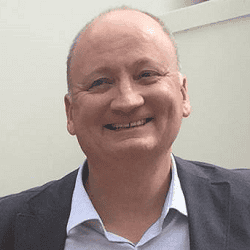
Damon Ansell
1998 Lincoln Fellow
You were one of the early Lincoln Fellows. How did you hear about the Claremont Institute?
I was working for Grover Norquist in Washington, DC at the time, and as such, had the good fortune of being exposed to a lot of what Claremont was doing in the academic arena. I was intrigued; an opportunity to learn and be amongst some of the smartest young people in America—how could I miss it. The truth is, I was a bit overwhelmed by the course but I stuck it out and what I know now is that it instilled a level of intellectual curiosity that remains today. Thank you Claremont for taking a chance on me.
There are all sorts of educational programs out there for current and rising conservative professionals. What do you think makes the Claremont Institute’s Fellowships unique?
I am not sure I agree with the statement that there were all sorts of programs like this back in the late 90’s, they seemed pretty limited in choice then. Unlike the other courses this course work was unique in its subject matter and tone. I was, and am, an Ayn Rand disciple and even at that time believed in the right to be individually respected by our country’s political establishment. We called ourselves the “Leave us Alone Coalition in Washington, recognized as citizens and respected by our government.” I felt that the Lincoln program would help me to understand the foundations for these feelings—and they did. It is also true to say that I continued my education at George Washington University, attaining a Master’s in Public Administration so I would say the blend was perfect for me and not mutually exclusive.
What’s your fondest memory of the Claremont Institute?
The late night, early morning conversations, that were more like battle than banter arbitrated by the late Harry Jaffa a curmudgeon with a big heart. Needless to say I was destroyed and fell into bed licking my wounds.
What is your current position?
My title is Director of Corporate Affairs for Diageo Africa Regional Markets (ARM) based in Nairobi, Kenya; I have been back for the last 12 years (Kenya was where I was raised). My responsibility is to manage a team of over 20 people across 27 Sub Sahara African markets to create a stable and fair regulatory and tax landscape for our businesses. My company, Diageo, is the largest producer of alcohol in the world and you will know our brands: Guinness, JWalker, Smirnoff, Baileys, Tanqueray and Captain Morgan, to name just a few. Ironically the libertarian approach to African governments is one that is well received, countries compete within Africa as states do within the USA.
What inspired you to choose this career?
To realize the dream of working within the Africa region, my home, and to do so in a manner that creates value and opportunity to the communities that we operate in. I am on the front lines of billions of dollars of investment in capacity and capability bringing jobs, supply chains, knowledge and more crucially money to many thousands directly and hundred of thousands indirectly. It inspired me every day!
What are you currently working on?
I am currently completing a ten year project to reform excise within African countries—the success of this initiative was recognized by my company last year. Governments welcome the reform as it increases revenue, attracts investment and provides jobs; companies enjoy the value added for shareholders—a win win. My next step is as of now unknown so watch this space.
If you could have a drink with an American Founder, or any great thinker, who would it be, why, and what would you order?
Why of course a rum with Alexander Hamilton. I would interrogate his love for Federalism, a strong national government and encourage him to take marksmanship lessons.
Who was more important for their time, George Washington or Abraham Lincoln? Why?
This is a trick question I am sure; I will take the bait. Without George Washington there would be no Lincoln in my view. To patiently prosecute the War of Independence, despite the lack of resources and in the face of significant early defeats (New York) is truly amazing. George Washington showed a tenacity—and more importantly, a flexibility and willingness/deference to evolving his strategy—that earned his place in history. I also have to admit a bias—being a George Washington alumni of course.
Now that you live and work in a foreign country what do you feel is the greatest challenge facing the United States today?
The US tax code and how uncompetitive America has become—I see it every day. Whereas historically American businesses and businessmen and women dominated the continent, today we are losing to our friends in the East, Middle East and Europe. This is not a siren call to fear China but rather a statement of practical fact. The main reason we lose is US insistence to tax its citizens working overseas—an incandescent and incessant persecution of our labor. The tax reform earlier this year helped, US companies can now repatriate profit BUT individuals cannot—the irony of that is rich. I also worry about a slip back into isolationism and anti-free trade policies—I am a big believer in the principles of free trade.
What books are you reading right now?
War of Two by Robert Sedgwick—fascinating to understand the personal similarities between Aaron Burr and Alexander Hamilton. The fact that they ended up on opposing sides of a duel however was destiny and a foregone conclusion by the end of the Civil War.
The other book I am reading—why read one when you can read two at the same time—is… Those Angry Days by Lynne Olson. What draws me back to this book is the sentiment of America first versus Internationalism and the similarities to what I see happening in America today. I am conflicted I must admit and sifting through sentiment for answers.

